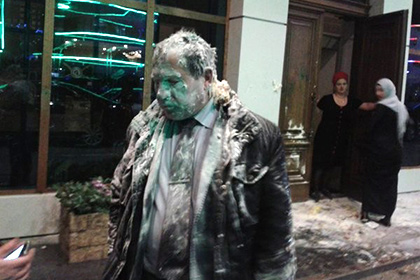
Attack in Grozny on Member of Presidential Council Forces Kremlin Response
Publication: Eurasia Daily Monitor Volume: 13 Issue: 55
By:

On March 16, a well-known human rights activist, Igor Kalyapin, who heads the Committee for the Prevention of Torture, was attacked in Grozny, Chechnya. Soon after Kalyapin’s arrival in Grozny, the administration of the hotel where he was staying asked him to leave the premises. After the rights activist stepped out of the hotel, a mob attacked him, using eggs, flour and other substances. The assailants quickly retreated after the attack and the police reportedly did not go after them. The attack came only days after another high-profile incident, in which unidentified individuals beat up a group of journalists and rights activists near the Chechen-Ingush administrative border (Kavkazsky Uzel, March 16).
Kalyapin has repeatedly criticized the governor of Chechnya, Ramzan Kadyrov, for human rights violations, so many observers assumed that Kadyrov was behind the attack. The Russian government has not been known to care much about human rights activists. Igor Kalyapin, however, is a member of the Council for Human Rights under the President of the Russian Federation, which meant Moscow had to react to the incident, at least in some way. Also, two successive attacks on rights activists in and around Chechnya have had a cumulative effect.
On March 17, the Russian president’s spokesman, Dmitry Peskov, stated that the attack on Kalyapin was connected to the earlier assault on the rights activists in Ingushetia. Peskov diplomatically called the incident “a continuation of the criminal and quite dangerous attack, which occurred before, on the border with Ingushetia. This is a very dangerous trend, which is certainly a cause for concern.” The head of the Russian presidential human rights council, Mikhail Fedotov, stated that he would insist on launching a criminal case against the perpetrators of the attack (Lenta.ru, March 17).
Even the notorious human rights ombudsman of Chechnya, Nurdi Nukhazhiev, condemned the aggression, saying that “the attack on the head of the ‘Committee for the Prevention of Torture’ Igor Kalyapin is quite an unpleasant event. It does not bode well for the Chechen Republic and the Chechen people. I want to urge our young people never to do such a thing again. Whoever he is, for us a guest is an inviolable person” (Rbc.ru, March 18).
A pro-Kremlin journalist well-known in the North Caucasus, Maksim Shevchenko, who has been quite supportive of Kadyrov and his policies in Chechnya, stated that the Chechen authorities must quickly investigate the incident and punish the perpetrators (Kavkazskaya Politika, March 18).
The attack on Kalypin, particularly coupled with the violent harassment of journalists and rights activists in Ingushetia, does not come at a good time for Ramzan Kadyrov. The Chechen governor’s term in office ends on April 5, and he is still waiting for Putin’s approval to run for the post again. From the legal standpoint, the situation is quite awkward since Chechnya formally elects its governor along with other Russian regions through direct popular elections. Unlike the other republics of the North Caucasus, Chechnya did not opt out of direct gubernatorial elections. Yet, for some reason, Kadyrov is waiting for Putin’s approval to run for office. Two weeks before his term as governor runs out, Kadyrov still does not seem to know whether he will be allowed to run for the governor’s post or not.
Reportedly, Moscow is still considering appointing Kadyrov to a position at the federal level. The idea is to “decouple” Kadyrov from Chechnya and replace a highly independent ruler of Chechnya who wields a large support base, including a small personal army, with a “safe” Russian bureaucrat without a support base who can easily be controlled by Moscow. One of the proposed compromises included giving Kadyrov the position of head of the North Caucasian Federal District. However, most of the North Caucasian governors would likely resent it if one of them was suddenly elevated and put in charge of overseeing their work. At the same time, Kadyrov would likely suspect that Moscow wants to detach him from Chechnya and cut him off from his support base in the republic. Also, if Moscow appoints Kadyrov as the head of the North Caucasian Federal District, its plans for further mergers and partitions of federal districts in southern Russia may be derailed. According to some sources, Moscow is considering merging the Southern and North Caucasus federal districts. Some suggest that Crimea may be amalgamated into the Southern Federal District (Onkavkaz.com, March 14).
If Moscow decides to merge the Southern and North Caucasus federal districts, it is highly unlikely that it will appoint Kadyrov to head it. The only region in the North Caucasian Federal District with a predominantly ethnic-Russian population, Stavropol, has repeatedly revolted against being made part of a district that includes ethnically non-Russian republics. Ethnic Russians would be even more resentful if a Chechen were to govern a united federal district in southern Russia, which makes such a development quite unlikely.
With Kadyrov’s term as governor term quickly running out, the situation surrounding Chechnya’s ruler remains quite tense. It appears that pressure is mounting on the Kremlin to make Kadyrov a less visible person, which would mean removing him from the post of governor. The Kremlin apparently has not yet decided what to do next in Chechnya. Political transitions following an authoritarian ruler are hard not only at the national level but also at the regional level, which is likely to prevent Moscow from making decisive moves in the republic anytime soon.




